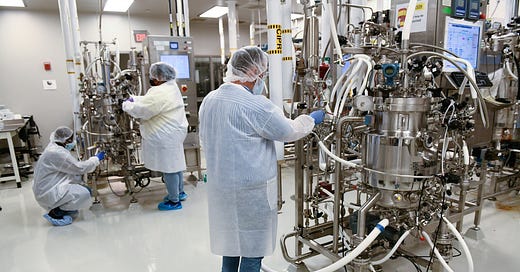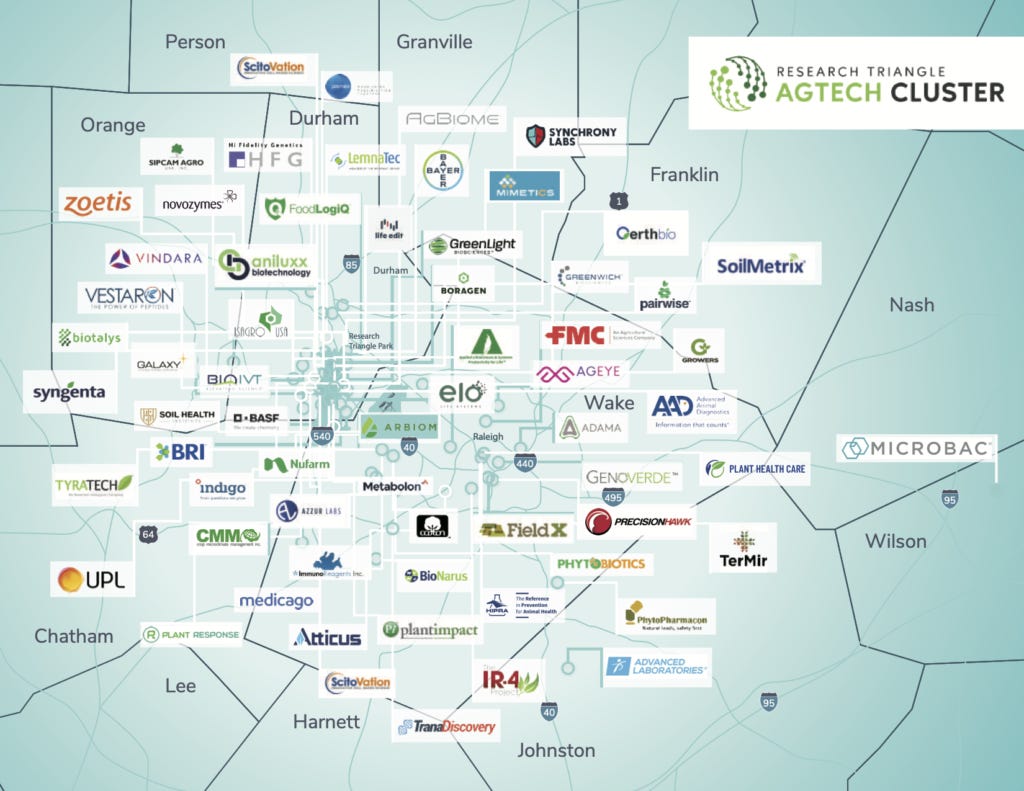Overscienced but Underfunded: Research Triangle, NC (Durham, Raleigh, Chapel Hill)
Impactful science and technology can be invented anywhere
At KdT, we believe that impactful science and technology can be invented anywhere, not just in Boston and the Bay Area. Overscienced but Underfunded is a series where we highlight innovation in emerging regions, and aggregate resources for ambitious scientist-entrepreneurs in underappreciated geographies. If there’s a region you want to see cover, please let us know!
Background
The Research Triangle (Chapel Hill, Durham, and Raleigh), is one of the nation’s top biotech hubs (we would be ranked higher if we had San Diego’s weather). Home to three top research universities (UNC-Chapel Hill, Duke University in Durham, and NC State University in Raleigh), the Triangle has a high density of PhDs that benefit from a low cost of living. Less well known is the sheer industrial infrastructure powering the Triangle. Research Triangle Park (commonly known as “RTP”) is the largest research park in North America with over 800 biotech/life sciences companies and 10.6 million square feet of biotech offices, laboratory and manufacturing space.
Driving down Davis Drive (like Sandhill Road, but cooler), you’ll notice offices for biotech giants like Biogen, BASF, GSK, and Pfizer. Big Tech has taken notice of the opportunity and talent in the Triangle as well - Google, Apple, Microsoft, and Meta are all building new offices here. In this essay, we will break down the strengths of the Triangle, and highlight exciting opportunities for biotech scientists and entrepreneurs in the region.
Strengths of the Research Triangle - Gene Therapy, Biomanufacturing, and Agriculture
Gene Therapy
Gene therapy is a bedrock of the Research Triangle, largely due to the success Jude Samulski, a pioneer in the field whose work has resulted in 3 of the FDA approved gene therapies. Samulski’s scientific family tree consists of several successful scientist-entrepreneurs from the area, including Aravind Asokan (Founder of StrideBio, Torque Bio), Stephen Gray (Taysha Therapeutics), Chengwen Li, and Matthew Hirsch. Across town at Duke University, Charlie Gersbach has built Duke into a leading institute for gene editing and epigenetic modification.
Highlighting some of the most notable companies in the region:
Asklepios BioPharmaceutical (AskBio) - Fully integrated (manufacturing, preclinical development, and capsid development) AAV gene therapy company whose portfolio of clinical programs include neuromuscular, central nervous system, cardiovascular and metabolic disease. AskBio was acquired for $4B by Bayer in October 2020.
Life Edit Inc - Life Edit has designed an innovative RNA-nuclease and base-editing platform to target any genomic sequence in order to develop a wide range of interventions for genetic disorders. Through the use of non-pathogenic microbes, Life Edit can develop a diverse array of novel RNA-guided nucleases which offer gene editing tools with higher fidelity, novel functionality, reduced immunogenicity and easier delivery.
Precision Biosciences ($DTIL) - Publicly traded gene editing company using novel yeast nucleases with higher specificity than other gene editing technologies. Lead allogeneic CAR-T program is in clinical trials, and in vivo gene editing pipeline is in IND-enabling studies with a lead program in OTC deficiency. Precision IPO’d in 2019, reaching a peak market cap of $2B prior to biotech market instability, and have subsequently spun out Elo Life Systems, an independent food and agriculture business in 2021.
Atsena Therapeutics - Clinical stage, AAV ocular gene therapy company with a lead program targeting Leber congenital amaurosis 1 (LCA1) in Phase I/II trials. The three part platform is defined by 1) laterally spreading capsids to ensure robust retinal delivery 2) dual vectors capable of increasing payload delivery and 3) intravitreal capsids to provide an easier route of administration for ocular gene therapy.
Tune Therapeutics - Preclinical stage, precision epigenome editing company aiming to genetically tune DNA sequences without causing DNA strand breaks. Their platform utilizes a dCas9 to tether epigenetic modifiers to specific DNA sites, allow specific targeting and modification of epigenetic elements involved in chronic diseases, overcoming limitations in gene packaging capacity and off-target double strand breaks by nuclease-based systems.
Kriya Therapeutics - End-to-end gene therapy design, development, and manufacturing platform. Their proprietary computational engine (SIRVE) integrates large volumes of molecular, immunological, and other clinical data to design effective gene therapies to target metabolic disorders, neurology, rare diseases (from acquisition of Warden Bio from Duke) and ophthalmology indications. They also have an internal GMP manufacturing facility that supports in-house production of their assets to address the traditional limitations of scale up of gene therapies.
Biomanufacturing
RTP is nationally renowned for its capabilities in therapeutic biomanufacturing, with 7,000 new jobs and $7 billion in new investment since 2020. This is largely due to the combination of affordable land and office/lab space, and a history of success in gene therapy (see above). Many companies, including Novartis, Pfizer, Beam Therapeutics, Kriya Therapeutics, and Jaguar Gene Therapy, have shifted viral and cell therapy manufacturing to North Carolina. Furthermore, government initiatives in surrounding regions like Clayton, Pittsboro, and Wilson are incentivizing more real estate investment to build better infrastructure. With significnat tailwinds for biomanufacturing from the US government, we expect RTP to continue to diversify and expand its manufacturing excellence, extending beyond therapeutics into other verticals such as synbio fermentation and more.
Highlighting some of the most notable companies in the region:
Curie Co - Curie aims to replace petrochemical-based preservatives in personal beauty products to reduce the amount of chemicals entering our environment, bodies, and waterways. Through directed evolution and metabolic engineering, they identify organisms that have Asepsilase activity, a key enzyme in their product, Servalase. This enzyme is scaled up using existing biomanufacturing processes and can serve as a key ingredient in products from hand soap to hair care products.
Tiamat - Tiamat is engineering plants to serve as bioreactors to produce proteins for novel food applications, cellular agriculture, cell & gene therapy, and vaccines. Their platform is purpose-built to be cheaper, faster, and more modular than traditional protein synthesis engines and delivers an endotoxin and pathogen free protein to a wide array of customers. Their initial services include plant growth factors for cultured meat, cytokines for cell & gene therapy, and enzymes for mRNA synthesis.
KBI Biopharma - Biopharmaceutical contract manufacturing company that assists in a multitude of services for researchers. KBI’s services include cell line development, process and formulation development, biophysical characterization as well as preclinical and clinical manufacturing.
Isolere Bio - Delivers biomanufacturing solutions at commercial scale. Using their IsoTag platform, they can purify biologics from contaminants. These high quality biologics can target viral vectors, antibodies, nucleic acids and enzymes by utilizing protein binding affinity and phase separation techniques. They were acquired by Donaldson (NYSE: DCI) in February 2023.
DMC Biologics - DMC aims to produce bio-based chemicals and ingredients through sustainable ways and enable supply chain resiliency. Their Dynamic Metabolic Control platform combines the traditional 2-stage fermentation process by utilizing a gene silencing and proteolysis method to create a gene network that can amplify the production of specific proteins. The initial beachhead is producing L-Alanine (a key amino acid used in nutrition, pharmaceutical applications, and other ingredients).
Lindy Biosciences - Lindy Biosciences is a development-stage company that specializes in protein therapeutic formulations. The company uses a process called micro glassification, which removes a majority of the water from solutions of proteins or other biologics, which turns them into solid, amorphous microbeads - greatly increasing stability for long-term storage, transport and incorporation into drug delivery formulations.
Agriculture
Three of the four “Big Ag” companies (BASF, Syngenta, Corteva) have significant operations in the Triangle, highlighting North Carolina’s strategic positioning in the southeast US as the de facto Agtech capital. The NC biotech center holds quarterly Agtech meetings led by the efforts of Paul Ulanch, which have helped form a well-connected and collaborative Ag investor community.
The Alexandria Center for AgTech is one of the main gathering places, and is the largest real estate investor in the industry. Blake Stevens, Head of Food and Ag for Alexandria Ventures, lives in RTP and hosts social events at the many new restaurants opening up on Alexandria’s campus. Efforts from early stage investors like Ryan Bethencourt have also expanded conversations beyond agricultural innovation to include food-based innovations and more.
Highlighting a few of the most notable companies in the region:
AgBiome - AgBiome discovers and develops innovative biological and trait products for crop protection. Their platform efficiently captures diverse, unique microbes for agriculturally relevant applications, and screens them with industry-best assays for insect, disease, and nematode control.
Pairwise - Utilizes CRISPR technology to analyze and edit the DNA sequences that control different traits in our food. Pairwise can develop fruits and vegetables that are smaller, more nutrient dense and more disease resistant. They released the Conscious Foods brand that includes leafy greens, berries, and cherries.
Elo Life Systems - Spun out of Precision Biosciences with the goal of using scalable gene editing (the ARCUS nuclease) to engineer novel traits into crops for specific food applications to develop nutritious ingredients and protect our world’s food supply. Their first product is to develop a healthy, tasty monk fruit sweetener and have a partnership with Dole to protect the Cavendish banana from fungal invaders.
Traitology - Combining the power of computational biology and genetic engineering to develop novel traits in soybean and other global food crops to enhance yield and other important characteristics.
RNA therapeutics
RTP is a leader in RNA therapeutics, both RNA as a therapeutic modality and small molecules that target RNA itself. From Kevin Weeks, a leader in the structural characterization of RNA, to Bruce Sullenger, an expert in developing novel active biomolecules, you will find a number of faculty that live and breathe RNA.
The RNA scene in RTP is so strong that the national RNA society has its own subchapter in the region, and holds its own annual conference. However, much of this academic research has been untapped and has yet to be translated commercially. Regado Biosciences was the closest success in this space, but a Phase III trial failure due to PEG immunity concerns led to a dissolution of the novel aptamer platform. We believe this is a massive translational and entrepreneurial opportunity for the Research Triangle. Commercially, this hasn’t had de facto success as the other verticals above, but there are some very promising start-ups focused on these efforts.
Highlighting a few of the most notable companies in the region:
Ribometrix - Discovers RNA motifs that are therapeutically relevant and finds binding pockets where small molecule drugs can bind and exert their effect. They have numerous collaboration and biobuck deals with Vertex and Genentech.
EnFuego Therapeutics - Founded at UNC by Chad Pecot, a cancer survivor himself, he’s developing next-generation RNA interference-(RNAi)-based and antisense oligo therapeutics to target specific targets in lung, pancreatic, and colon cancers.
Torque Bio - a “stealth” mode company that is working on novel circular RNA technologies.
New Frontiers
Two emerging areas of rapidly growing interest in RTP are epigenetics and precision medicine.
In the epigenetics field, UNC’s Genetic and Molecular Biology program is one of the most well-funded departments by the NIH, and boasts 20+ faculty working on epigenetic technologies. Down the road at Duke, Charlie Gersbach is also pioneering some translational efforts in this domain (see Tune Therapeutics above). Research groups in RTP are carefully dissecting the underlying biological substrates of epigenetics, as well as engineer translational systems to enable precision modification, a prior limitation in the field.
In the world of precision medicine, UNC has leveraged its computational sequencing clusters to generate exciting, proprietary datasets. Faculty like Channing Der, a key researcher in KRAS, are evidence of these efforts (such as his research on the kinome). Duke’s renowned Biomedical Engineering (BME) Department, led by Tosh Chilkoti (who has many commercially oriented technologies himself, see InSoma Bio, Isolere Bio, and Gateway Bio), is building systems for the interrogation of both genetic cancer susceptibility as well as drug response.
A few of these companies are highlighted below.
Epigenos - Personalized epigenome-based therapeutics that leverages Cas9 editors and epigenetic modifiers to enable highly targeted, reversible, dose-dependent gene function for genetic disorders using a dose-dependent trigger molecule.
Tavros Therapeutics - Employs a high-throughput functional genomics discovery platform to uncover unique weaknesses in cancer cells that are exposed by drug treatment. The goal of Tavros’ platform is to identify a clear clinical path for novel drug development with the knowledge of predictive biomarkers and possible drug combinations to improve therapeutic response. Tavros recently signed a biobucks deal with Vividion for $930M.
Xilis - Xilis utilizes its MicroOrganoSphere (MOS) technology to guide precision therapy for cancer patients and accelerate drug discovery and development of novel therapeutics. Xilis’ MOS platform is the first organoid platform to provide immunotherapy prediction and enables screening of 1000s of candidates in less than 7 days.
Important Groups & People to Know:
Duke New Ventures office - led by Jeff Welch, Duke’s New Venture Office is the intro to first-time faculty founders, where early stage technology is being guided by a very well designed network of Entrepreneurs in Residence.
UNC Kickstart Venture Services office - led by Mireya McKee, Kickstart provides resources and support to first-time faculty founders. Kickstart hosts a quarterly meeting to help nurture and advise early-stage companies in incubation through local VCs and advisor participation.
NC State Office of Technology and Commercialization - led by Wade Fulgham, NC State’s OTC is the first door into seeing what innovation is coming out of NC State related to biomedical engineering (through partnership with UNC) and agtech opportunities.
Council of Economic Development (CED) - a local, non-profit organization that supports Founders in the Triangle commercializing all forms of innovation. Jay Bigelow works with early-stage start-ups and is a great person to interface to see technologies that have matured either past the university stage or were derived elsewhere.
The best local watering holes and things to do:
Chapel Hill
Oakleaf - upscale, farm-to-table dining that highlights the prowess of local Carolinian ingredients.
Crunkelton - the sophistication of a NYC cocktail in the ambience of a Southern gaming lodge. Bartenders compete nationally in cocktail competitions.
Top of the Hill (“TOPO”) - historic bar and grill that overlooks the infamous Franklin Street, where UNC students celebrate after Duke wins
Durham
M Sushi - the flagship restaurant of the M restaurants, all led by renowned chef, Michael Lee. Any of the M restaurants will be an interesting, great culinary experience, but M Sushi is the GOAT.
Ponysaurus - Durham is known for its breweries and this is the undisputed top dawg (although others may try to claim Fullsteam has an advantage).
Picnic - If you’re looking for that North Carolinian BBQ, look no further. Picnic has both East Carolina tangy, vinegar based sauces as well as the sweeter, thicker West Carolinian style
Rose’s Noodles, Dumplings, and Sweets - a farm-to-table Asian restaurant for great lunch and early dinner fare. It’s incredibly unique in its ability to blend locally sourced ingredients to make mouth-watering ramen and other plates.
RTP/Raleigh
Boxyard RTP - in the heart of RTP, find a collection of great little lunch pop-ups and a brewery that typically has live music on a Sunny day. It’s the quintessential representation of work-life balance in the Research Triangle.
G58 - upscale, elegant Chinese that’s outside of downtown Raleigh and convenient drive in the Triangle. 5 Master Chefs from China prepare an array of decadent culinary dishes.
The Goat - if you’re in a bit of a hurry, but don’t want to wait at the airport, the Goat is a great bar/grill nearby that serves a full tap selection with some good grub.











